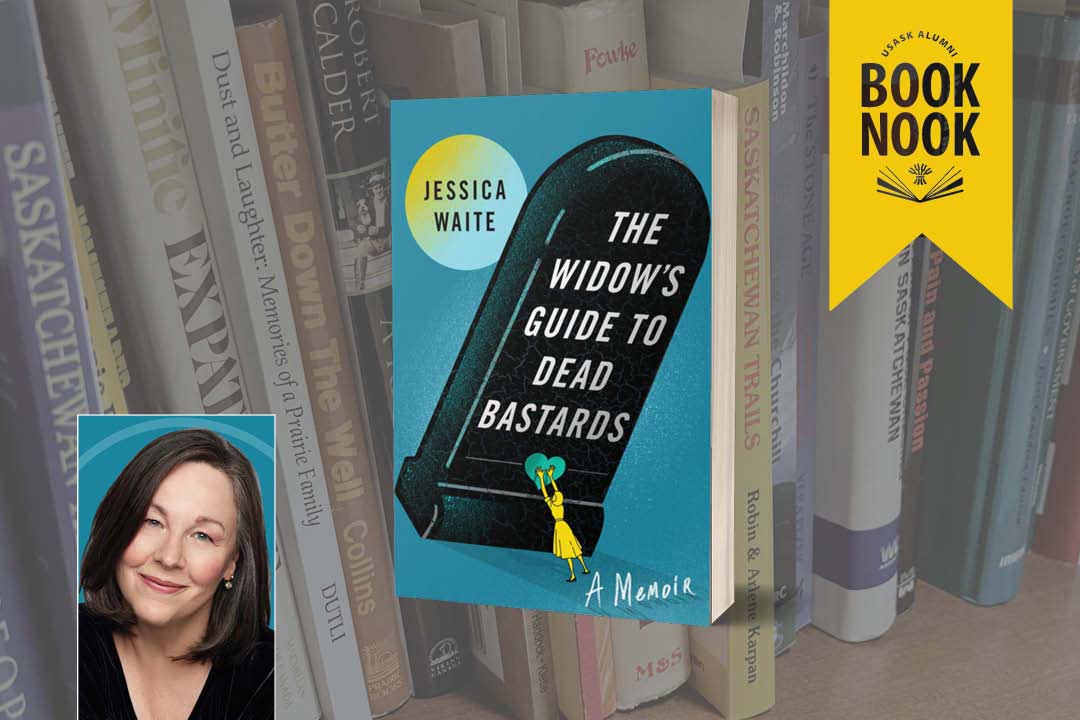
Alumni Book Nook: Jessica Waite (BA’94)
Calgary-based writer Jessica Waite is the author of "The Widow’s Guide to Dead Bastards: A Memoir"
University of Saskatchewan (USask) graduate Jessica Waite, who earned a Bachelor of Arts degree in psychology from USask’s College of Arts and Science in 1994, is an educator, mentor, and mother. In 2022, she received the Jon Whyte Memorial Essay Award, and her essays and works of short fiction have been anthologized in the U.S., the U.K., and Canada. Waite is now the author of The Widow’s Guide to Dead Bastards: A Memoir, her first book, which is scheduled to be released by Simon & Schuster on July 30, 2024.
What have you been doing since you graduated from USask?
I’ve worked in the private and not-for-profit sectors, lived internationally in Japan and Singapore, and raised a wonderful human being to adulthood. I spent eight years writing my first book, beginning after the unexpected loss of my husband in 2015.
What is the focus of your new book?
The book focuses on the nature of love and betrayal, the impact of secrets and intergenerational trauma, and the process of healing and forgiveness. It challenges conventional tropes, and questions whether unresolved relationships can be repaired. Additionally, the book touches on the themes of single parenthood, mental health, and the resilience required to negotiate unexpected life changes.
What inspired you to write this book?
Life handed me a riveting, horrifying, and surprisingly beautiful story. I hoped the telling of it would help others feel less alone. After the unexpected death of my 47-year-old husband, I was left to raise our young son on my own. The day after the funeral, I uncovered startling secrets my husband had been hiding. Then, strange coincidences made me wonder if he might be trying to reach back from beyond the grave, seeking to make amends. The experience made me reconsider my views about life, love, and grief.
Your writing has been described as “hilarious prose,” yet you also tackle difficult topics, such as grief, loss, infidelity, and financial secrets. What was it like to write this memoir?
I shed a lot of tears over the eight years it took to write this memoir, but when I began to share my most agonizing, humiliating, shameful moments on the page, readers would often laugh. I saw the absurdity and laughed along. It’s a survival mechanism. The generous smattering of gallows humour is a counterpoint to some pretty heavy subject matter. As Carrie Fisher famously said, “If my life wasn’t funny, it would just be true, and that is unacceptable.”
Did your education at USask play a role in researching and/or writing this book? If so, how?
At USask I studied psychology and English. My education in both fields was pivotal in making sense of my strange and unfamiliar circumstances. I used narrative therapy techniques to heal and literary techniques to write a page-turning book other people would want to read.
How did you choose the title for the book?
“The Widow’s Guide to Dead Bastards” was suggested by one of my late husband’s best friends as a joke. I kept it on my whiteboard for almost a year, never intending to actually use it. My agent suggested changing the title before submitting to publishers, so I worked up my nerve and went for it. Saying the title out loud felt pretty awkward, at first. I loved my husband and held him in high regard. Now, I actually think he’d be OK with the title, given everything that happened.
You have been described as “the perfect guide for readers grappling with loss.” What do you hope readers take away from your book?
A good friend who’d just lost his wife called right after he finished the book. He said reading about my struggles and triumphs helped him feel less mired in his own sorrow. It opened up possibilities for him. That’s my ultimate hope—that someone reading my story would recognize themselves in the messy, imperfect way I navigated my circumstances, and feel more empowered to come to terms with their own life and relationships.
Why would you recommend your book to USask alumni?
These days, even the youngest USask alumni may find themselves confronting grief and mental health struggles. This book is for people who want to move beyond the limitations of their own pain, into greater empathy and peace of mind.


